Share
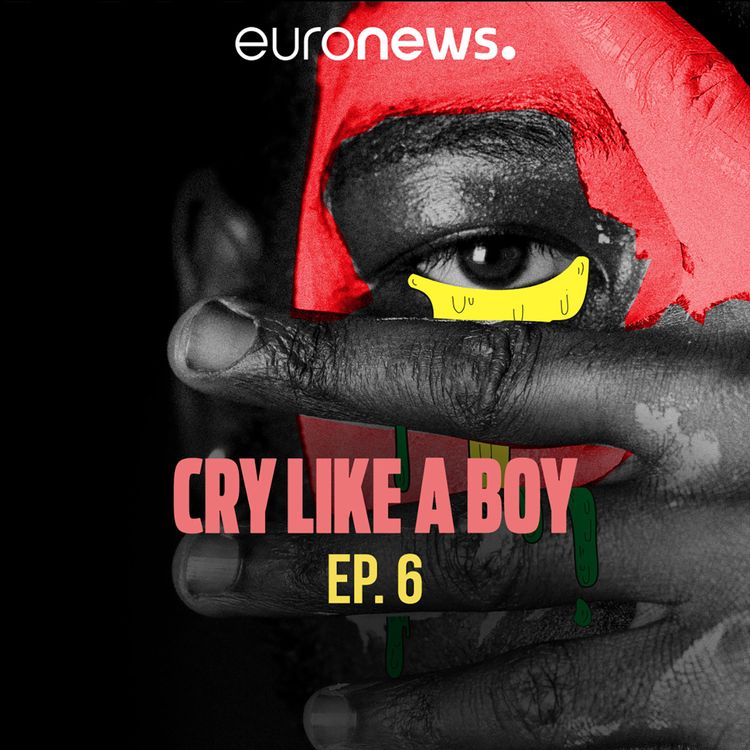
Cry Like a Boy
The Góor-jigéen in Senegal: The Past
A few decades ago, some Senegalese men openly identified themselves as not male or female, but as an alternative gender - the “Góor-jigéen” or “men-women”. Senegalese society accepted them, and they moved about freely in the streets of Dakar and other towns, dressed as women. Today, in those very same streets, men seen as behaving effeminately in any way are often harassed or attacked.
Do any Senegalese still remember the time when this didn’t happen? Why did things change?
In this episode, we investigate the colonial roots of homophobia in Senegal. To do this, we travel back in time to when Dakar was known as the “gay capital” of West Africa.
Hosted by Danielle Olavario; with original reporting and editing by Marta Moreiras in Dakar, Senegal; Naira Davlashyan, Marta Rodríguez Martínez and Lillo Montalto Monella in Lyon, and Lory Martinez in Paris, France; Clizia Sala in London, United Kingdom. Production Design by Studio Ochenta. Theme music by Gabriel Dalmasso. Music curation for this episode is by Natalia Oelsner. Graphic Design by Alexis Caddeo & Alois Bombardier. With editorial and production assistance from: Ignatius Annor, Tokunbo Salako, Paul Hackett and Sylvain Dutang. Our editor in chief is Yasir Khan.
In this episode, we used music by Sahad Sarr, a Senegalese artist and songwriter, involved in the development of rural populations. You can check out his work at sahadpatchwork.com.
This episode features extracts from Friends (The One With Joey's Bag, 1999) and Lambe, La lutte sénégalaise (Paulin Soumana Vieira, 1963). You can check more information about his work and buy the film in www.psv-films.fr.
Like this episode? Share your thoughts on how you have challenged your view on what it means to be a man with Euronews using the hashtag #CryLikeaBoy. And if you are a French speaker, this podcast is also available in French: Dans la tête des hommes.
More episodes
View all episodes

Euronews presents - The Star Ingredient
01:27|Our new documentary podcast series will take you on a culinary journey across Africa where we’ll meet communities and local chefs on a mission to revive the continent’s indigenous crops - all while sharing delicious new recipes and flavours.Subscribe to The Star Ingredient on your favourite podcast app or find it on euronews.com or africanews.com from October 28.Ce podcast en français: La surprise du chef.This project was funded by the European Journalism Centre, through the Solutions Journalism Accelerator. This fund is supported by the Bill & Melinda Gates Foundation.
23. The challenges of men working with men
16:29||Ep. 23The job of Edward Wageni, the director of HeForShe*, is to find the tools to help men change their behaviours towards women and push for structural shifts on all levels.In this episode of Cry Like a Boy, we discuss the challenges that Wageni faces working with men and why gender equality is good for everyone, not just women. *HeForShe is a UN initiative that focuses on engaging men and boys to achieve gender equality. The movement has numerous famous ambassadors, among them is actor Emma Watson, who was one of the first voices of the campaign in 2014 with a speech that quickly went viral.This is a special spin-off episode of Cry Like a Boy hosted by Mame Peya Diaw and produced by Naira Davlashyan and Marta Rodriguez Martinez.Music theme: Gabriel Dalmasso.
22. Being queer and masculine
19:49||Ep. 22“Masculinity isn’t really a thing,” argues journalist and LGBTQIA+ activist Georges M Johnson. In this episode of Cry Like a Boy the author of the critically-acclaimed memoir ‘All Boys Aren’t Blue’ addresses the questions around race, identity and gender. They also speak about how opening up about their experiences as a queer Black person living in the US changed their life. This is a special spin-off episode of Cry Like a Boy hosted by Mame Peya Diaw and produced by Naira Davlashyan and Marta Rodriguez Martinez.Music theme: Gabriel Dalmasso.
21. Genocide: Men are also victims of rape
18:05||Ep. 21In Cry Like Boy, we have spoken about the trauma caused by Liberia’s civil war. But conflict is a global issue. In this new episode, we ask Adama Dieng about the impact such a violent act as genocide can have on men, women, or victims of rape. And what can be done to prevent genocide. Adama Dieng is a former UN Registrar of the International Criminal Tribunal for the Tutsi genocide of Rwanda. In 2012, UN Secretary-General Ban Ki-moon appointed him as UN Special Adviser on the Prevention of Genocide.This is a special spin-off episode of Cry Like a Boy hosted by Mame Peya Diaw and produced by Naira Davlashyan and Marta Rodriguez Martinez.Musical theme: Gabriel Dalmasso.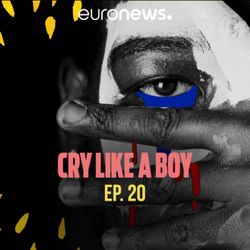
20. The soldiers in Liberia: My voice was a weapon
14:52||Season 1, Ep. 20Cecelia Danuweli realised she had the power to change the course of Liberia’s war in 2003. She joined a group of brave women who organised peaceful protests in front of the warlords. Their actions had a better range than bullets. Years later, this story was received with a standing ovation at the Tribeca Film Festival in New York as award-winning director Gini Reticker made this extraordinary rebellion of women into a film with the documentary Pray the Devil Back to Hell (2009).In this second part of the conversation, Reticker and Danuweli reflect on the impact of women's power to end war. Hosted by Mame Peya Diaw in Nairobi, Kenya. With original reporting and editing by Carielle Doe in Monrovia, Liberia. Marta Rodriguez Martinez, Naira Davlashyan, Lillo Montalto Monella in Lyon. Lory Martinez in Paris, France and Clizia Sala in London, UK. Production Design by Studio Ochenta. Theme by Gabriel Dalmasso. Our editor-in-chief is Yasir Khan.For more information on Cry Like a Boy, a Euronews original series and podcast, go to Euronews.com to find opinion pieces, videos, and articles on the topic. If you’re a French speaker, this podcast is also available in French: Dans la tête des hommes.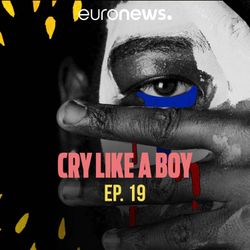
19. The soldiers in Liberia: A woman's war
15:41||Season 1, Ep. 19Liberia witnessed a spiral of violence, hunger, and death for more than a decade. But women said enough was enough and united to try and end the war. They came together regardless of their origin, class, or religion.Cecelia Danuweli was one of these women who began by denying their husbands sex and started holding peaceful protests. She, like many other women, ended up redefining the front line of a brutal civil war. Award-winning director Gini Reticker traveled to Monrovia to tell the story of these women. In this episode of Cry Like a Boy, the pair reflect on what this peaceful revolution meant. Hosted by Mame Peya Diaw in Nairobi, Kenya. With original reporting and editing by Carielle Doe in Monrovia, Liberia. Marta Rodriguez Martinez, Naira Davlashyan, Lillo Montalto Monella in Lyon. Lory Martinez in Paris, France and Clizia Sala in London, UK. Production Design by Studio Ochenta. Theme by Gabriel Dalmasso. Our editor-in-chief is Yasir Khan.For more information on Cry Like a Boy, a Euronews original series and podcast, go to Euronews.com to find opinion pieces, videos, and articles on the topic. If you’re a French speaker, this podcast is also available in French: Dans la tête des hommes.
18. The soldiers in Liberia: The invisible wound
20:38||Season 1, Ep. 18After witnessing the murder of his parents and siblings, Morris Matadi was recruited as a child soldier in the Liberian civil war. One day he managed to put down his rifle and fled. But the horror of war did not end there: he kept returning to the battlefield with vivid nightmares and experienced other symptoms of post-traumatic stress disorder (PTSD), such as anger attacks. All this in a context where these warriors, who once lived by their own rules, became the black sheep of society once the war ended.In this episode, we rejoin Liberian journalist Carielle Doe to explore the war wounds that are invisible but take longer to heal. A wound that not only deeply scars the lives of ex-combatants, but of Liberian society, which today struggles to confront its past.With original reporting and editing by Carielle Doe in Monrovia, Liberia. Marta Rodriguez Martinez, Naira Davlashyan, Lillo Montalto Monella & Arwa Barkallah in Lyon, Mame Peya Diaw in Nairobi, Lory Martinez in Paris, France and Clizia Sala in London, UK. Production Design by Studio Ochenta. Hosted by Danielle Olavario. Theme by Gabriel Dalmasso. Special thanks to Peya Mame and Natalia Oelsner for collecting the music for this episode. Our editor-in-chief is Yasir Khan.In this episode, we used music by Liberian artist Faith Vonic. You can find out more about her music in her Youtube, Instagram, Facebook, and Twitter accounts.For more information on Cry Like a Boy, a Euronews original series and podcast, go to Euronews.com to find opinion pieces, videos, and articles on the topic. If you’re a French speaker, this podcast is also available in French: Dans la tête des hommes.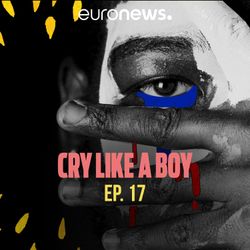
17. The soldiers in Liberia: A men’s war
20:32||Season 1, Ep. 17Jonathan is a Liberian man in his late forties. When we first met him in Monrovia, the capital of Liberia, Jonathan gave us the impression of being a laid-back guy. But his persona changed as soon as he started to talk about the war. In this episode, we join Liberian journalist Carielle Doe to explore the memories of the country‘s civil war by following the life trajectory of this former soldier. A bloody battle in which masculinity was pushed to the extreme. With original reporting and editing by Carielle Doe in Monrovia, Liberia. Marta Rodriguez Martinez, Naira Davlashyan, Lillo Montalto Monella & Arwa Barkallah in Lyon, Mame Peya Diaw in Nairobi, Lory Martinez in Paris, France and Clizia Sala in London, UK. Production Design by Studio Ochenta. Hosted by Danielle Olavario. Theme by Gabriel Dalmasso. Special thanks to Peya Mame and Natalia Oelsner for collecting the music for this episode. Our editor-in-chief is Yasir Khan. In this episode, we used music by Liberian artist Faith Vonic. You can find out more about her music in her Youtube, Instagram, Facebook, and Twitter accounts.For more information on Cry Like a Boy, a Euronews original series and podcast, go to Euronews.com to find opinion pieces, videos, and articles on the topic. If you’re a French speaker, this podcast is also available in French: Dans la tête des hommes.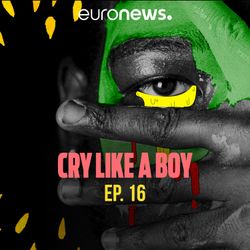
16. Tounkan namo in Guinea: Unwelcome home
16:52||Season 1, Ep. 16When young guys like Mamadou don’t succeed in their dangerous adventure from West Africa to Europe, they’re often not welcome back home. Why is there such pressure on men to succeed and how does this affect women? In this episode, Khopotso Bodibe continues his conversation with a South African lawyer and rights activist Sharon Ekambaram and Julie Kleinman, a US anthropologist and author of the book “Adventure Capital: Migration and the Making of an African Hub in Paris”.This show has been produced with Khopotso Bodibe in Johannesburg, South Africa. Naira Davlashyan, Marta Rodríguez-Martinez, Lillo Montalto Monella in Lyon, France, Arwa Barkallah and Mame Peya Diaw in Dakar, Senegal. Special thanks go to Lory Martinez, Clizia Sala from Studio Ochenta for helping us produce this podcast. Theme by Gabriel Dalmasso. Our editor-in-chief is Yasir Khan. For more information on Cry Like a Boy, a Euronews original series and podcast, go to Euronews.com to find opinion pieces, videos, and articles on the topic. If you’re a French speaker, this podcast is also available in French: Dans la tête des hommes.